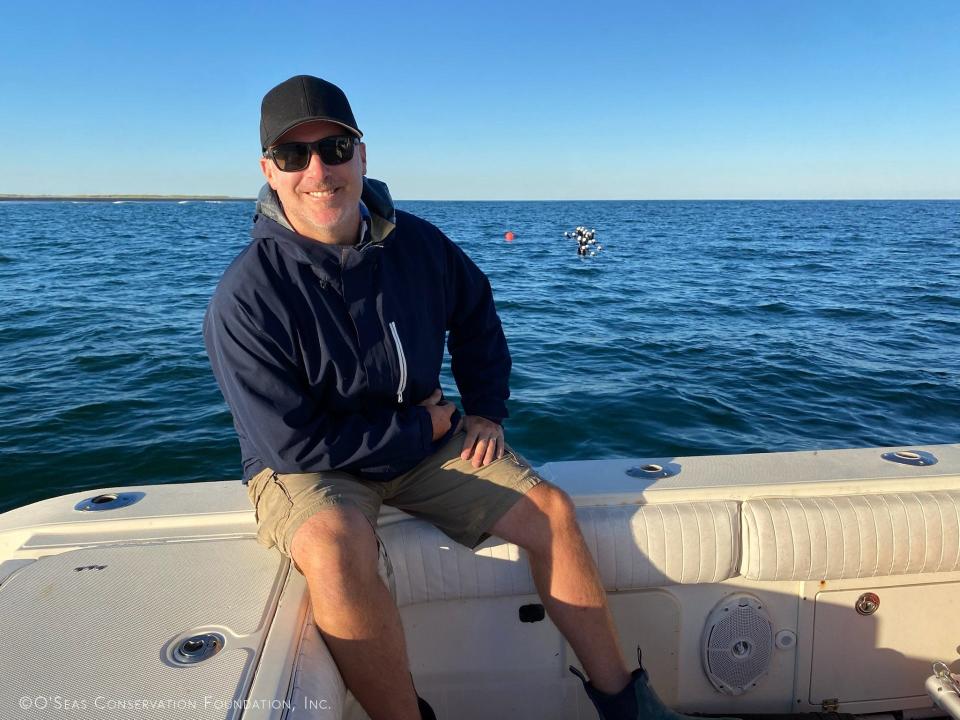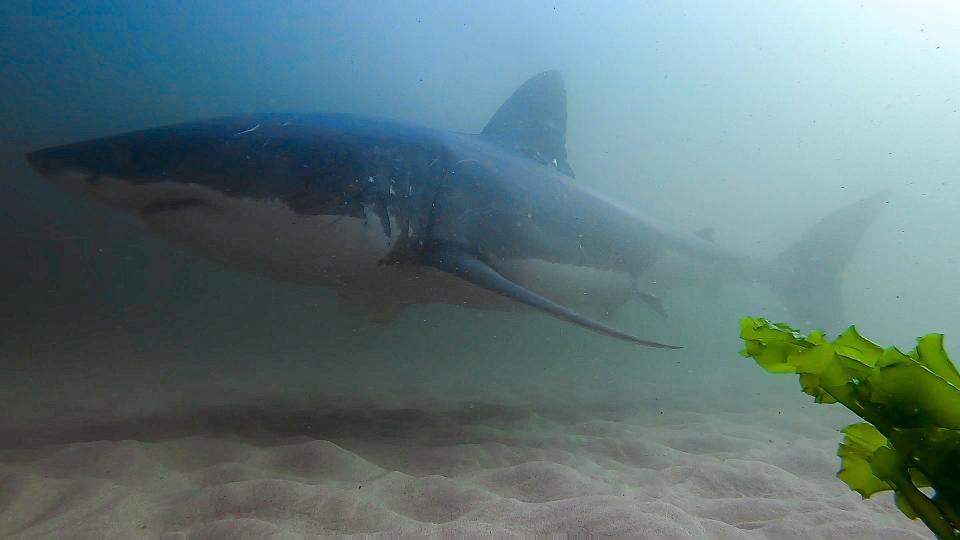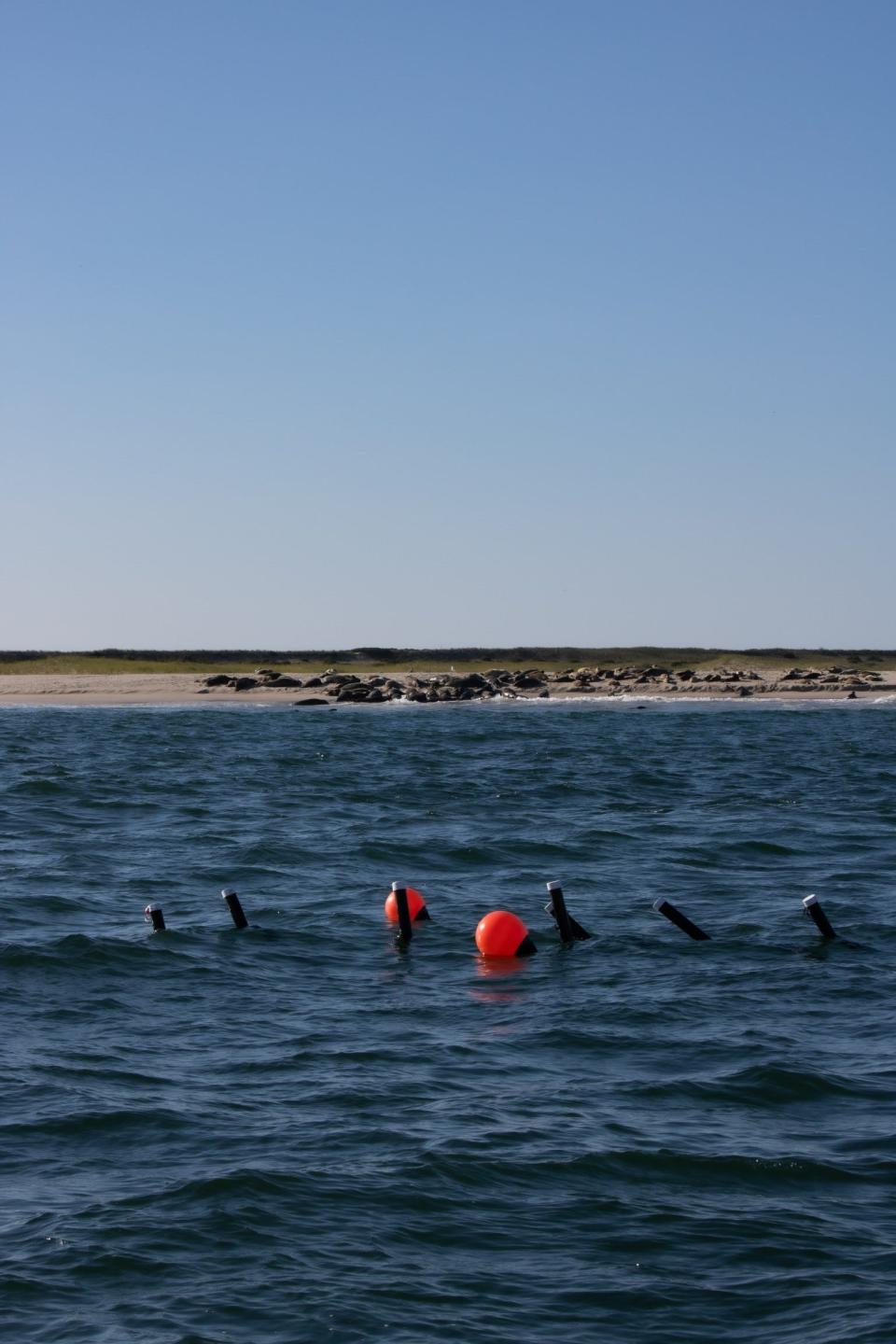They built a shark barrier off Cape Cod. Does Rhode Island need one?
"Do you think we'll see any great white sharks?" shark researcher Craig O'Connell asked his boat mate as they started a trip along the Cape Cod shoreline a few years ago.
O'Connell's boat mate was Greg Skomal, an expert who has documented the increasing shark population off Cape Cod.
"He laughed at me," O'Connell recalled last week.
Cruising between Monomoy Island and Nauset Beach for about two hours on that trip in 2017, Skomal and O'Connell spotted 11 different great white sharks.
O'Connell, who runs a shark conservation foundation out of Montauk, New York, can be excused for making Skomal laugh. As a kid on family vacations in the 1990s and early 2000s, O'Connell spent many hours swimming off Cape Cod's Nauset Beach without the slightest thought he might be sharing the water with sharks.

Times have changed.
Great white sharks have become regular visitors to outer Cape Cod, where they feast on an abundant gray seal population, and sometimes attack humans. In September 2018, a 26-year-old Revere, Massachusetts, man died after he was bitten while boogie boarding off Newcomb Hollow Beach in Wellfleet. A month earlier, a 61-year-old New York man was seriously injured when he was attacked while swimming off Long Nook Beach in Truro.
The Cape has taken steps to keep swimmers and surfers safe. Warning signs are posted near beach entrances. Researchers use spotter planes, tracking devices and drones to monitor sharks. An app relays information when sharks are spotted. But the risk remains.
Now O'Connell, founder and director of O'Seas Conservation Foundation, is developing a barrier that would safeguard people swimming in places like Cape Cod, and also protect people and sharks in locations like Australia, where protective measures like nets and drumlines kill many sharks and species such as sea turtles and dolphins.
O'Connell tested his Exclusion Barrier in a place called Shark Cove off Chatham's Monomoy Island this fall and was encouraged by its performance. Baiting the sharks toward the barrier by putting big chunks of tuna behind it, O'Connell was pleased to see them avoid the structure.
"They swam completely around the barrier to get to the other side to get to the bait," he said.

How does the barrier work to keep sharks out?
The barrier works like a combination of structural and electric fence that extends from the sea floor to the surface. The barrier is a series of interconnected black plastic pipes filled with "strategically placed electro-magnetic stimuli," O'Connell said. The piping provides a visual barrier to turn sharks away, but if they persist and get too close, they get shocked, according to O'Connell.
With a boat on the water and underwater cameras, researchers off Cape Cod were able to document eight different white sharks moving around the structure to get to the bait, according to O'Connell.
Storms and turbulent sea conditions during testing this fall also showed that the structure could withstand rough waters, O'Connell said.
It marked O'Connell's third successful test of the barrier. He had tried it previously off Cape Cod and also off the Bahamas in 2021 and 2022, where it was used on bull sharks, which are considered even more dangerous than white sharks.
"We will be relentless in our pursuit in replacing beach nets and drumlines with our Exclusion Barrier technology, in places like South Africa, Australia and Reunion Island, and if we can also help in places like Cape Cod, or even New York, we will happy to do so,” O’Connell said.

Will the barriers protect swimmers around Cape Cod?
Shark safety is an "extremely critical issue" for Cape Cod, according to Heather Doyle, co-founder and chair of Cape Cod Ocean Community Inc., a nonprofit agency that supports white shark safety measures on Cape Cod.
With the shark population off Cape Cod continuing to grow, she says it makes sense to look into technology that would keep swimmers safe. She doesn't know whether any Cape communities are ready to try such a barrier, but her agency plans informational presentations this winter to spread the word on the idea.
"It's worth looking into," she said. "Why wouldn't you?"
O'Connell envisions barriers protecting swimming areas of about 200 yards along beaches. To make it easier for communities to adopt such systems, the equipment would be donated, he said.
Do Rhode Island beaches need the barrier to keep swimmers safe?
Jon Dodd, executive director of the Atlantic Shark Institute in Wakefield, doesn't see a need for such a barrier in Rhode Island waters right now, but that could change.
White sharks have been spotted off Rhode Island, but big, adult sharks are most likely to bypass Rhode Island for the potential feast offered by thousands of seals off Cape Cod, according to Dodd.
However, his and other agencies are studying a growing seal population around Block Island's North Light. Could that population grow large enough to regularly draw great white sharks to the area as the population on Cape Cod has?
"Hopefully that never happens," Dodd said.
If it does, perhaps O'Connell's system could be employed.
In the meantime, O'Connell says he will keep testing his barrier and looking for places where it can be used to keep people and sea life safe.
“To me," he said, "nothing matters more than protecting the future of our planet and this is my organization’s way of contributing."
This article originally appeared on The Providence Journal: Great white shark barrier tested off Cape Cod to keep swimmers safe

